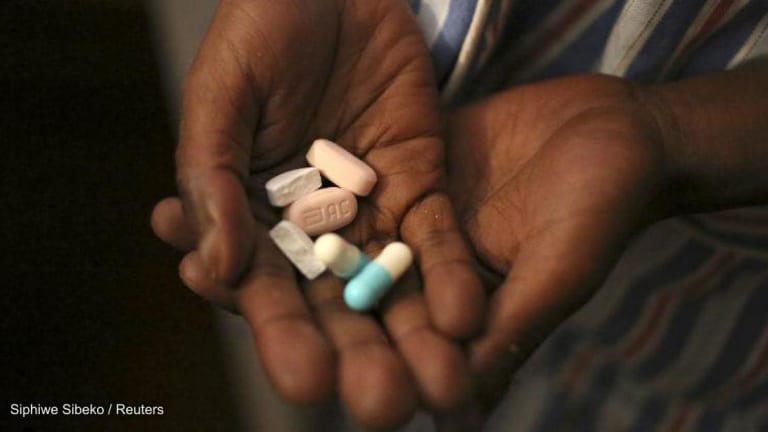PEPFAR chief calls for an accelerated and sustainable HIV response
Dr. John Nkengasong outlines three priorities to sustain and accelerate progress. First, ensure that those receiving treatment continue to stay on it. Second, address gaps in prevention efforts. And third, focus on sustainability.
Over the past two decades, the U.S. President’s Emergency Plan for AIDS Relief, or PEPFAR has been a key partner in driving the expansion of HIV services, resulting in significant achievements. “It almost looked impossible when we started this journey collectively, where in Africa, only 50,000 people out of the millions that were infected with HIV were receiving lifesaving treatment,” Dr. John Nkangasong, head of PEPFAR, said at Devex World 2024. “Look at where we are today. PEPFAR alone has more than 20 million people receiving lifesaving treatment. We've saved over 25 million lives, mainly in Africa, and prevented about 5.5 million children from being born of HIV.” Looking ahead to 2030 and beyond, Nkengasong outlined three priorities to sustain and accelerate this progress. First, ensure that those currently receiving treatment continue to stay on it. Second, close gaps in the response to reduce new infections. And third, focus on sustainability — not only in terms of funding but also in maintaining political commitment, refining program needs, and strengthening partnerships. Sustainability, he emphasized, requires more country ownership. “The partner government — we are only a partner. So it has to be owned and led by countries,” he said. “Countries — Botswana, Cameroon, Uganda, — must say, this is how I'm going to go to 2030 and beyond 2030 this is what I need to do, to treat my people. … The partners cannot lead.” Nkengasong also called for more action to meet the UNAIDS 95-95-95 targets by 2025: ensuring that 95% of people with HIV know their status; 95% of those who know their status are receiving treatment; and 95% of those on treatment achieve viral suppression. Several PEPFAR-supported countries, including Botswana, Namibia, Rwanda, and Zimbabwe, have already met these targets, “which means it can be done,” he said. “But we have to do more.” He said it was vital not to lose focus on HIV, to achieve the 2030 Sustainable Development Goal of ending HIV/AIDS as a public health threat. “My greatest worry,” he warned, “is that you get to 2030, we look back and we say, look, we've put in more than $150 billion but we are not successful. What will happen to the international community? They will throw their hands up and say: ‘No we tried, and we just have to live with this.’”
Over the past two decades, the U.S. President’s Emergency Plan for AIDS Relief, or PEPFAR has been a key partner in driving the expansion of HIV services, resulting in significant achievements.
“It almost looked impossible when we started this journey collectively, where in Africa, only 50,000 people out of the millions that were infected with HIV were receiving lifesaving treatment,” Dr. John Nkangasong, head of PEPFAR, said at Devex World 2024. “Look at where we are today. PEPFAR alone has more than 20 million people receiving lifesaving treatment. We've saved over 25 million lives, mainly in Africa, and prevented about 5.5 million children from being born of HIV.”
Looking ahead to 2030 and beyond, Nkengasong outlined three priorities to sustain and accelerate this progress. First, ensure that those currently receiving treatment continue to stay on it. Second, close gaps in the response to reduce new infections. And third, focus on sustainability — not only in terms of funding but also in maintaining political commitment, refining program needs, and strengthening partnerships.
This story is forDevex Promembers
Unlock this story now with a 15-day free trial of Devex Pro.
With a Devex Pro subscription you'll get access to deeper analysis and exclusive insights from our reporters and analysts.
Start my free trialRequest a group subscription Printing articles to share with others is a breach of our terms and conditions and copyright policy. Please use the sharing options on the left side of the article. Devex Pro members may share up to 10 articles per month using the Pro share tool ( ).
Rumbi Chakamba is a Senior Editor at Devex based in Botswana, who has worked with regional and international publications including News Deeply, The Zambezian, Outriders Network, and Global Sisters Report. She holds a bachelor's degree in international relations from the University of South Africa.




